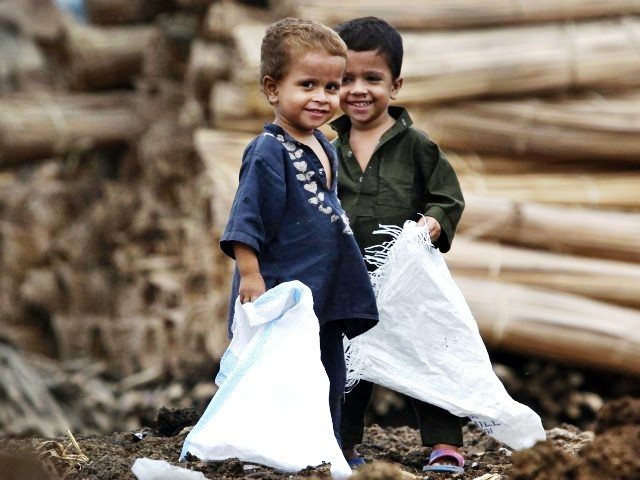Open to abuse: Stamping out childhood on the streets of Mingora
According to Khpal Kor Foundation, minors beg, work, trade sexual favours to inflate family income.

File photo of children who beg on the streets for income. PHOTO: REUTERS/FILE
The number of children on the streets is increasing rapidly in Mingora, according to child protection organisation Khpal Kor Foundation. Many have parents who earn but force their children to beg or find any work on the streets to contribute to the family income.
“We found a majority of children begging in the streets at night. Their parents compel them to earn a specified amount daily and if the child fails to meet the fixed amount, their fathers do not allow them to enter their home,” Khpal Kor Foundation Director Mohammad Ali told The Express Tribune. “Consequently, the child has to spend the night outside their house, on the streets.”
“Today I could not manage to earn Rs 300; I am still short of Rs60. I cannot go home as my father will beat me, it is better to sleep here than take my father’s harsh punishment,” Hassan told The Express Tribune when he was spotted sleeping on a street in Mingora bazaar. Hassan is eight years old.
The foundation – which runs an orphanage in Mingora – has undertaken a project with a non-profit called Vision and the district government. Their aim is to divert street children from begging and other illegal practices by providing opportunities for education, and taking action against their parents and child abusers.
How and how many?
Director Mohammad’s team actively follows street children involved in begging – tracing their parents and informing the district administration after thorough investigation. The organisation estimates there are at least 210 children on the street, exposed to all sorts of abuse.
“A large number of these children belong to migrant families. Their fathers do not work and force their children to work and earn money for the family,” added Mohammad.
Youth activists in Mingora are attempting to collect data from all the tehsils in Swat but it will not be easy or quick. Not counting other street children, they estimate child beggars alone are in the thousands.
“There has been a rapid increase in the number of street children since Swat’s militant uprising and the following operation. A majority of these are children who were orphaned during 2007-2009,” said Iftikhar Ali, a child rights activist.
From school to scrappers to sex abuse
To escape physical abuse, these children on the street turn to prostitution. “When these children are unable to earn the set amount, it is easy for them to fall prey to sexual abusers who actively run groups in Mingora. These people will pay children in exchange for fulfilling their own objectives,” explained Imran Khan, a project coordinator in Khpal Kor Foundation.
According to Asif Khan, an outreach worker for street children, a small number first finish their school day before they head off to scavenge salvageable items from garbage points in Mingora, anything which can be sold. “These children work in extremely unhygienic conditions and suffer from several diseases which they transmit to other family members.”
Eight-year-old Suliman’s father Mohammad Alam is a porter at Mingora bazaar. Suliman adds to whatever his father earns by collecting scraps from garbage heaps and selling them. Alam claims he would rather send his child to school but poverty is a hurdle. “My child helps me make ends meet. I realise it isn’t good for him but we don’t have another choice.”
Cheap and underage labour
Such minors are an easy source of affordable labour for commercial hubs where they become the very definition of ‘overworked and underpaid.’
“Hotel, vehicle and shop owners hire children for a lesser amount for longer shifts. The children don’t always live in Mingora so they end up taking residence wherever they are employed, making it easy for the older employees to sexually abuse them,” said Salman Khan, another outreach worker.
For begging the buck stops here
“We forward cases to the district administration and they take prompt action. They call in the fathers and try and stop them from sending their children to beg on the streets,” said the Khpal Kor Foundation Director.
According to Mohammad, the deputy commissioner is taking a personal interest to control begging. A committee has been formed comprising the social welfare department’s child protection unit and Khpal Kor Foundation.
The committee, under the deputy commissioner, should not only aim to control begging, but “also work for the welfare of children hired as labour. “Endowment funds must be set up for these children to educate them and make them productive citizens,” recommended Mohammad.
There was a Beggars Home (BGH), shared District Social Welfare officer Hamid Khan, “but it shutdown after the staff was fired by previous governments. We are hopeful it will be reopened and the BGH will provide skill training courses.”
“We are also trying to establish a welfare home for other street children.”
There is no international definition of a “street child”. According to Street Children, a UK-based organisation, UNICEF created three broad categories: “Children ‘of’ the street — those who sleep in public spaces without their families; Children ‘on’ the street, who work on the streets during the day and return to their home to sleep; and ‘Street-family children’ who live with their family on the street.” But these do not necessarily work for all countries and all situations; research shows definitions keep evolving with the variables at hand.
Published in The Express Tribune, September 8th, 2013.



















COMMENTS
Comments are moderated and generally will be posted if they are on-topic and not abusive.
For more information, please see our Comments FAQ